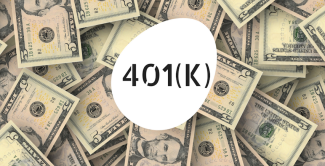
What is a 401k?
As a Certified Financial Planner ® I am passionate about helping people realize their financial success and their retirement dreams. Being from the millennial generation, I also don’t want to bore you with arduous information rambling on and on endlessly. No – I want you to get excited about saving money and your financial planning, not fall asleep two or three paragraphs in!
So, let’s get started. Grab a coffee, put your feet up and I’ll guide you through everything you need to know about a 401K.
What is a 401k plan and how does it work?
When you become gainfully employed, a common retirement plan referred to as a 401K is widely available by many employers and allows you as an employee to make pre-tax contributions to this plan which are earmarked for your retirement.
The days of defined benefit plans, commonly known as pensions, are nearing an end. There has been a major shift to the use of defined contribution plans.
A 401k plan is also known as a Defined Contribution (DC) plan. In DC plans, the plan defines the contributions that an employer can make, not the benefit that will be received at retirement. Some employers will match a percentage of your pay and put that money into your 401k account for you as an added benefit for working there. It is up to the employer if they will match. They also can elect to make a profit-sharing contribution each year but do so at their discretion. Since the benefit is not defined other than how much is being contributed, the retirement outcomes are not known in advance, thus putting the entire burden on the employee to plan for their own retirement needs.
As simply as possible 401k works by way of employee contributions being automatically deducted from the paycheck each month and the money is taken out before the employee's paycheck is taxed. The contributions are invested as per instruction from the employee, with a large variety of ways to invest.
While your investments grow in the 401k account, you do not pay taxes on any growth. You only need to pay taxes on the money when you start to take money out in your retirement years, at which time you will pay whatever your current income tax rates are.
Remember these important points for your 401k plans:
The sooner you start investing in your 401k, the better – even if you think you can’t afford to. A 401k is a retirement plan and not a savings account – so be mindful that these funds will be hard to access in an emergency, more on this later.
It’s important to seek guidance from your financial advisor regarding how a 401k may fit into your overall financial situation. Often times it is a great way to save for your retirement, but it is not always the answer, or should I say only answer, for saving money for your future.
Take the time to understand how your plan works, what investment options you have, etc. Most plans usually have an advisor or service center you can contact to get all the information and guidance you need. The easiest way is to check via your account online or to contact your HR manager to whom to speak.
What is the maximum contribution for 401k in 2019?
You may be thinking, can I just put all my income in this account? (if you can save that much that is awesome!) Short answer, no. These plans are designed to allow you to save some of your income, not all of it. Also, the IRS and subsequently our government has an annual operating budget which is derived in large part from income taxes collected. If people sheltered all their income in a 401k plan then there would be a lot less tax revenue for our government, they simply can’t operate without the taxes paid by your income.
As of November 1, 2018, the IRS announced in Notice 2018-83 cost of living adjustments affecting dollar limitations for pension plans and other retirement-related items for tax year 2019. In other words, the IRS updated how much you can save in a 401k account.
Highlights of Changes for 2019
Contribution limit for employees is increased from $18,500 to $19,000.
The additional catch-up contribution limit for individuals age 50+ is $6,000, thus is you are 50+ in 2019 you could save up to $25,000 in your 401k account, pre-tax.
How does a 401K grow?
The adage “youth is wasted on the young” might be fitting when it comes to retirement planning. If you’re a young person, you’ve probably not given much thought to retirement and it’s understandable. It’s quite a difficult concept to plan for something that is 40 or 50 years away. Not to mention the fact that it is intimidating as investing for retirement takes on financial jargon that is difficult to grasp.
That being said, the sooner you start saving, the better off you will be when you retire.
Why You Need to Start Saving For Retirement Today
We think we have time, but time flies! It therefore makes sense that the longer your money grows, the more you’ll have when you retire. Let me share a quick example of how I can help you make your money grow:
The power of compounding interest is truly an amazing strategy that anyone who saves can benefit from.
Here’s an example:
Assume you start saving in your 401k at age 25. You contribute $6,000 a year, never increasing it, and do so for 40 years. That’s a total of $240,000 you would have contributed over the 40 years. Let’s assume an annual return of 7%, compounded. At this rate of return, the ending balance of your 401k would be $1,281,657.42! Whoa! That’s over $1 million of growth.
Now assume the same scenario but change when you start saving to age 30. You figure you are still young and would rather spend your $6,000 on paying down some student loans or getting a nicer car, etc.
From age 30 to 65 you would have now saved $210,000, only $30,000 less than if you had started at age 25. But, still assuming the 7% annual return, your ending 401k balance would only be $887,480.76, a whopping $394,176.66 less than if you had started at age 25! That $30,000 you used for other stuff ended up costing you almost 400k in future retirement savings!
See what I mean about compounding, the sooner you start the better off you will be!
Borrowing from Your 401(k)
I strongly urge you to use your 401k as a last-ditch effort If you need access to emergency funds. If you are in a bind and there is no alternative for you, then there is a way to access the money in your 401k. The amount you can borrow from your 401k is up to your employer. In most cases, you can borrow in the form of a loan up to half of the money you have contributed and have up to five years to pay the loan back. If the loan is not repaid within the time limit, the loan converts to a withdrawal and a 10% penalty plus income taxes is payable.
This account should not be considered a place for you to go into. As part of your overall financial plan, you should have set up separate emergency accounts and an account for future purchases like a house or college for the kids. The 401k is a “retirement” account, not an emergency account, so use it for retirement!
Rolling Over Your 401(k)
Should you decide to leave a company for another job or to retire, you have a few options as to what you can do with your 401k:
- You can leave the money in the old 401k and let it keep growing as long as their plan allows you to do so.
- When you start new employment, you can open a new 401k with your new employer, if it is offered, and roll over your old 401k into the new one.
- Open up a traditional/rollover IRA and roll your 401k into it.
When you leave a company, you can take the funds in your 401k with you by rolling it over tax-free into a rollover IRA (or new 401k). An IRA is another type of tax-deferred retirement account whereby you can keep your money and it will continue to grow tax-free until you retire.
Roth 401(k)s
The popularity of the Roth 401k is becoming much more mainstream. More and more employers are starting to offer Roth 401(k)s. Instead of offering pre-tax money to your account, with a Roth 401(k) you invest after-tax money. You don’t get the upfront tax break that you’d get with a traditional 401(k), but when you withdraw money from your Roth 401(k) at retirement, you don’t have to pay any income tax on any of the money. There are some other benefits to Roth-type retirement accounts, but I’ll be talking more about that in our article on IRAs.
Can you lose money in 401k?
You’ve been diligent for years and putting money away in a 401k for your happy retirement years. But one day you check your account only to find out that you have less money now than when you contributed in the first place.
This is disappointing, to say the least!
Anytime you invest money in a market-based investment that is not guaranteed you run the risk of losing money. Think of your 401k investments as a roller-coaster, you will have highs and lows, but eventually, you finish the ride and get off. The balance of your 401k account will act the same way.
There are some basics you should think about when investing.
Re-evaluate your investments and goals
Assessing your investment portfolio regularly regardless of performance is a good thing but seeing the account’s balance lower than anticipated can be alarming. Perhaps this is exactly what is needed to give you that extra push to look at your investments and financial goals.
Consult with your financial advisor to look over your investment portfolio and suggest alternative investments and options. Make sure the advisor you entrust is a fiduciary! Due to changes in the values of the funds or your goals, you might want to make changes to your investments or explore entirely new options with your advisor.
Should you increase your 401k contributions?
Maybe. This will be dependent upon your particular situation and cash flow. Through the use of a comprehensive financial plan, you can figure out how much you should be saving and when/if you should increase the amount. Bear in mind, that your 401k is, depending on your age, an investment that you’ll be growing over a 20 to 40-year period so there is a high likelihood that you will increase your contribution rate over the years.
Should you stop making contributions or withdraw money?
Look, markets fluctuate, however, deciding to just stop making contributions during a market downturn usually isn’t a good idea. How much you are saving and how your money is invested should be driven by the financial plan you have in place. Don’t wing things and hope they get better; plan and you stand a better chance of reaching the financial success you desire.
Is it better to pay off debt or save for retirement?
It seems logical advice to pay off debt rather than saving and investing your money. Or is it?
This is a typical case when common sense doesn’t make sense as most of us don’t behave logically. We are human and we tend to create debt. Now, if you wait to pay off all your debt before saving for retirement but never quite manage to pay the debt off, then guess what – one day you are going to realize retirement has come knocking on your door and you are completely unprepared and still possibly in debt. This is not the situation you want to find yourself in – not at all! If you are paying off the debt and simultaneously saving for retirement, you should end up on stronger footing than you otherwise would be. Again, through the use of a financial plan and proper cash flow planning you should be able to do both.
“Free Money” in your 401k account.
Say what?! Yes, it is possible to get free money in your 401k account. As I previously mentioned a lot of employers who offer 401k plans will also offer some type of matching incentive. This is free money they put into your 401k account based upon certain criteria.
For example, your employer has a “3% matching” program. This means that they will match 3% of your income as long as you also put in at least 3% of your salary into your income. So, if you make $100,000 a year and save 3% ($3,000) your employer will also put in (match) that 3% ($3,000), thus you end up doubling your contribution simply because you elected to save for your future. Hey, that’s the $6,000 a year savings we used in the example above!
This is a great opportunity to exponentially increase how much you are saving for retirement. You simply can’t beat “free money” so make sure to find out how to maximize any match your employer may have.
An exception to the rule is if you plan on leaving your employer before being vested in those matching contributions.
How to set up a 401k account
As daunting as it seems, you have to take responsibility for your future retirement needs as well as your current financial needs. A retirement plan should be as much a part of your budget as your rent, car, cell phone, and dining out. Debt may come or go but retirement should always be a priority.
If you haven’t already signed up for your retirement plan, make an appointment to meet with your HR manager to find out all the details about your company’s 401k plan. FYI, some companies are now automatically enrolling employees in the 401k plan, so look for this as it may have happened to you.
It is smart to then see how saving in the 401k plan fits into your great financial life, which is usually best done through the use of a financial plan and cash flow analysis.
I hope you have learned what a 401k is and how it can benefit you in the future.
Thank you for reading!
Cheers,
Derek Notman



